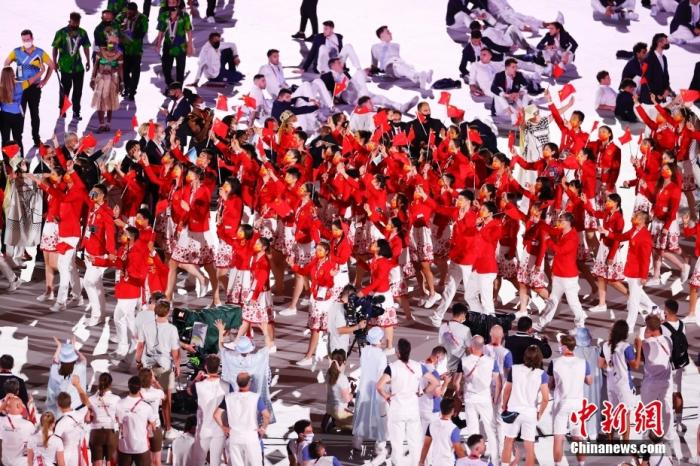China News Service, August 3rd. According to Kyodo News Agency of Japan, the Tokyo Olympics has entered the second half of the schedule with the rapid expansion of the new crown epidemic and the expansion of the emergency declaration area.
Japanese experts pointed out that the Olympics reduced the public's sense of crisis, and many people took the opportunity to gather, causing the epidemic to worsen. They described Japan as "declaring a state of emergency while celebrating the nationwide ceremony."
On the evening of July 29th, people admired the Tokyo Olympic flame on the Bridge of Dreams in Tokyo, the capital of Japan.
Photo by China News Agency reporter Tomita
The epidemic in Japan has not subsided
Does the Olympics reduce the public's sense of crisis?
On the 1st, Toshiro Muto, secretary-general of the Tokyo Olympic and Paralympic Organizing Committee, said that he believes that the epidemic has been at an expected level so far.
The infections of athletes, coaches, volunteers and other people directly related to the Olympics have been brought under control.
As of the 1st, the number of confirmed cases related to the Olympic Games was 264.
Muto emphasized: “We carry out more than 30,000 tests every day, and quickly isolate those who are positive to prevent the spread of infection, and we have taken practical and effective measures.”
But in fact, the outbreak of the epidemic in the Japanese community has not subsided. The number of new infections in Japan has exceeded 10,000 for 4 consecutive days on a single day.
Harada Takayuki, a professor of psychology at the University of Tsukuba in Japan, commented on the current situation in Japan: "While declaring an emergency, the whole country is celebrating a grand ceremony."
He analyzed that the Olympic Games has "indirect psychological effects such as a heated atmosphere and reduced sense of crisis, which have just become an excuse for not avoiding gatherings."
At the press conference on July 30, the chairman of the Japanese government's COVID-19 response team, Shigeru Ominami had to admit: "Because of the Olympics, it is difficult to convey a sense of crisis."
People from the Olympic Organizing Committee are impatient with the opinions that the hosting of the Olympics has caused people to relax their epidemic prevention.
"If people's attitudes are lax and the Olympics should be suspended, then should the summer vacation be cancelled?"
On July 23, the opening ceremony of the 32nd Summer Olympic Games was held at the New National Stadium in Tokyo, Japan.
The picture shows the entrance of the Chinese sports delegation.
Photo by China News Agency reporter Du Yang
High street crowds in Japan
Improved public attitude to the Olympics?
On the other hand, Japanese Prime Minister Yoshihide Suga stated that “the reduction in the flow of people is a fact” and emphasized that the Olympics is not the reason for the expansion of the epidemic.
However, according to a data on the flow of people, at 3 pm local time on July 31st, 7 out of 12 locations in Tokyo had more people flow than last week.
Although the government has decided to expand the target area of the emergency declaration, many passersby can still be seen on the streets of downtown Shibuya, where the Olympic flag is fluttering in the wind.
Around Tokyo Yurakucho station near the weightlifting competition venues, July 31 at 6 pm, after checking whether liquor signs, several groups of guests moved into the pub.
International Olympic Committee (IOC) President Bach said that "about 90% of Japanese nationals are watching the Olympics. The ratings and other figures reflect people's true feelings. The people have accepted the Olympics." He believes that he originally had a negative attitude towards hosting the Olympics. Japanese national sentiment has improved.
But the mood of the Japanese audience is very complicated.
It is said that a female company employee in Tokyo who is in her 40s who watched the Olympic Games broadcast from morning to night said that she watched it because it was broadcast. “But considering the epidemic, I don’t think hosting the Olympics is a good thing.”

